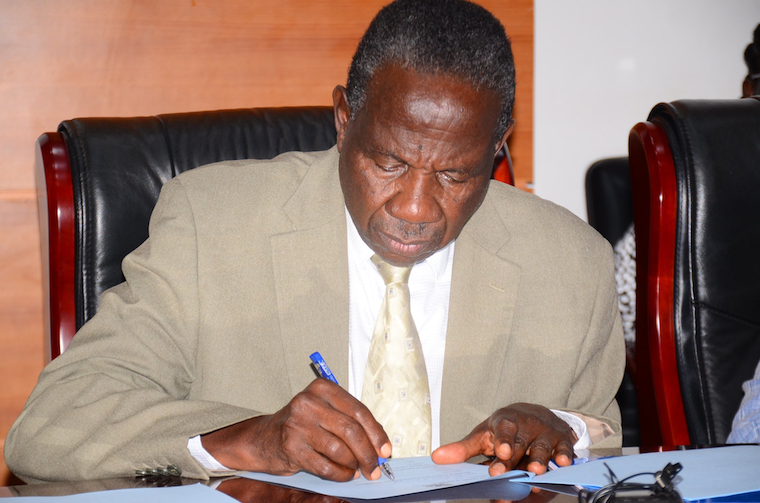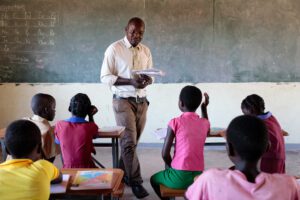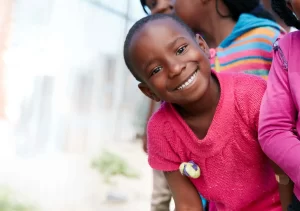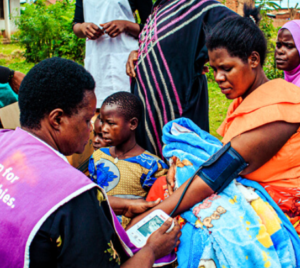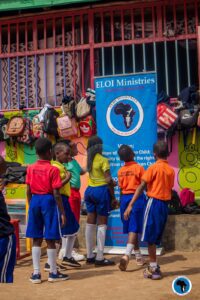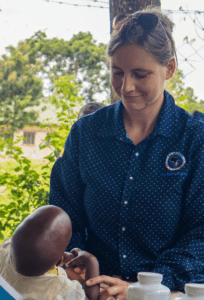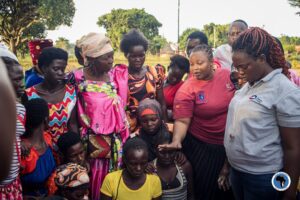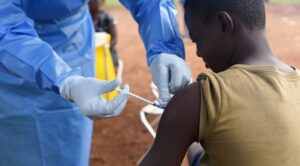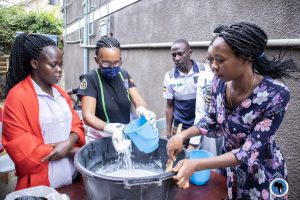- Written by Bagombeka Job

Finance minister Matia Kasaija
Last week, parliament passed the budget for the financial year 2024-2025, approving a total expenditure of Shs 72.136 trillion, which is Shs 14.050 trillion more than the initial budget proposal of Shs 58 trillion.
According to parliament, the government is projected to generate Shs 32.3 trillion through revenue collection to fund its budget. Additionally, the government is expected to borrow Shs 1.3 trillion from external sources and Shs 8.9 trillion from internal sources. Domestic debt refinancing (rollover) is anticipated to amount to Shs 19.8 trillion, and Shs 9.5 trillion is allocated for project support through grants and loans.
The budget estimates indicate that the first allocations will go to external debt repayments, which take Shs 3.149 trillion. Project support through loans and grants is allocated Shs 9.583 trillion. Domestic refinancing is set at Shs 12 trillion, while interest payments are a substantial Shs 9 trillion.
Other allocations include BoU recapitalization at Shs 603 billion, domestic arrears at Shs 200 billion, and domestic debt payment (BoU) amounting to Shs 9.1 trillion.
According to the committee on Budget report, the budget allocations per programme for the financial year 2024- 2025 are as follows:
• Human Capital Development: Shs 9.9 trillion (the largest allocation)
• Governance and Security: Shs 9.1 trillion
• Agro-industrialization: Shs 1.6 trillion
• Transport Infrastructure and Services: Shs 5.1 trillion
• Energy Development: Shs 1 trillion
• Private Sector Development: Shs 2 trillion
• Legislation, Oversight, and Representation: Shs 978 billion
• Development Plan Implementation: Shs 2.3 trillion
• Regional Development: Shs 1.5 trillion
• Mineral Development: Shs 41.6 billion
• Sustainable Development of Petroleum Resources: Shs 920 billion
• Tourism Development: Shs 404 billion
• Climate Change, Natural Resources, Environment, and Water Management: Shs 642 billion
Additionally, the following allocations were made:
• Public Sector Transformation: Shs 200 billion
• Manufacturing: Shs 207 billion
• Digital Transformation: Shs 230 billion
• Sustainable Urbanization and Housing: Shs 237 billion
• Innovation, Technology Development, and Transfer: Shs 346 billion
• Community Mobilization and Mindset Change: Shs 70 billion
• Administration of Justice: Shs 481 billion
The report indicates that the government will continue to implement its fiscal consolidation strategy in the financial year 2024-2025, aiming to place the economy on a long-term fiscal sustainability plan, including debt sustainability, in line with the Charter for Fiscal Responsibility.
The report indicated that the government will continue to implement its fiscal consolidation strategy in the financial year 2024/25, with the goal of placing the economy on a long-term fiscal sustainability plan, including debt sustainability in line with the Charter for Fiscal Responsibility.
Opolot Patrick Isiagi, the chairperson of the committee on Budget, said the strategy will entail enhancing domestic resource mobilization efforts, reducing wasteful expenditures by repurposing large public administration budgets, improving efficiency across the government, strengthening e-government processes, and improving efficiency in the execution of projects and public investments, among other measures.
BOOSTING HOUSEHOLD INCOME
In a bid to boost household income through the development of microenterprises, parliament allocated Shs 1.077 trillion to the Parish Development Model.
Additionally, Shs 100 billion was allocated to Emyooga SACCOs, with Shs 20 billion designated for teachers’ SACCOs. The Microfinance Support Centre Limited received Shs 50.07 billion, of which Shs 30 billion is intended for onward lending.

Furthermore, Shs 13.056 billion was allocated to the Uganda Women Entrepreneurship Programme (UWEP) as a revolving fund, and Shs 342.23 billion was earmarked for enhancing Growth and Productivity Opportunities for Women Enterprises (GROW).
Parliament also appropriated Shs 3 billion to help Jua-kali enterprises transition into the formal economy, Shs 5 billion for Enterprise Funds
for Older Persons, Shs 121.218 billion towards Social Assistance Grants for Empowerment (SAGE), Shs 13.2 billion for Special Grants for Persons with Disabilities, and Shs 8.7 billion towards the Youth Livelihood Programme (YLP).
INDUSTRIALIZATION AND PRIVATE SECTOR DEVELOPMENT
Shs 174.99 billion was allocated for SMEs in the manufacturing and export sectors through the Investment for Industrial Transformation and Employment (INVITE) program. Shs 155.6 billion was allocated for the infrastructure development of industrial parks.
Additionally, Shs 50 billion was earmarked for the capitalization of the Agriculture Credit Facility to support farmers, primarily agro-processors focused on value addition.
At least Shs 85.92 billion has been appropriated for the capitalization of the Uganda Development Bank. This funding will support the entire agriculture ecosystem, private sector players in increasing the stock and quality of tourism facilities, and the financing of local production of essential goods as a precursor to achieving import substitution, among other goals.
Shs 151.27 billion was allocated towards the Resource Enhancement and Accountability Programme (REAP) to increase resource mobilization, improve planning and public investment management, and strengthen accountability for quality, effective, and efficient service delivery.
COMMERCIALIZING AGRICULTURE
Breeding and Production: Shs 24.43 billion allocated to the National Animal Genetic Resources Centre and Data Bank (NAGRC&DB) for the breeding, production, multiplication, and distribution of animal seed and poultry to farmers nationwide.
• Animal Feed Production: Shs 13.1 billion designated for animal feed production on government ranches and farms.
• Disease Management: Shs 60 billion allocated for innovations in the management and control of livestock diseases, vectors, and parasites.
• Research: Shs 24.1 billion for research products and services suited for food, feed, market, and industry.
• Infrastructure Development: Shs 11.39 billion to develop the requisite research infrastructure to support the development of products for food, nutrition, and industry, accelerating the Agricultural Transformation Agenda.
Parliament also allocated:
• Oil Palm Production: Shs 24.88 billion to support the production, marketing, and extension of oil palm in Buvuma, Mayuge, and Kalangala districts under the ministry of Agriculture.
• Oilseed Development: Shs 72.6 billion to support oilseed research, multiplication, and agronomy in oilseed-growing districts.
• Seed Certification and Production: Shs 30 billion to support the certification and production of seeds, breeds, and fingerlings, including
the provision of machinery, laboratories, and irrigation equipment for seed testing and evaluation.
• Seed Storage and Processing: Shs 14.1 billion to establish and upgrade seed storage, threshing, and drying facilities to ensure a sustainable supply of quality seeds.
AGRICULTURAL INVESTMENTS AND IMPROVEMENTS
Animal Health: Shs 18.52 billion allocated for the purchase of assorted animal vaccines, tick acaricides, vaccine cold chain equipment, and various laboratory reagents, consumables, and supplies to control animal diseases.
Disease Diagnostics: Shs 32.4 billion designated for constructing disease diagnostic and analytical infrastructure to ensure quality assurance.
Quarantine and Evaluation: Shs 21 billion to revamp the National Animal Quarantine and Evaluation Centre in Entebbe, promoting exports and safeguarding the national herd during animal imports.
Mechanization: Shs 70 billion for constructing and equipping zonal agricultural mechanization centers.
Equipment Procurement: Shs 23 billion allocated for procuring tractors, matching implements, walking tractors, and assorted equipment and machinery units.
Water Supply: Shs 97.5 billion for providing bulk water supply to support irrigation, livestock and aquaculture.
Irrigation Schemes: Shs 56 billion for constructing the Acomai irrigation scheme and Shs 30.4 billion for constructing the Atari irrigation scheme to support rice production.
Aquaculture: Shs 134 billion for constructing and improving zonal aquaculture indoor hatchery and cage culture facilities to enhance fingerling production.
TRANSPORT INFRASTRUCTURE DEVELOPMENT
Standard Gauge Railway (SGR): Shs 2.221 trillion allocated to initiate the construction of the Standard Gauge Railway and continue implementing preparatory activities for the SGR.
Aerodrome Maintenance: Shs 3 billion designated for the maintenance of 13 aerodromes in Arua, Gulu, Paluba, Masindi, Lira, Kidepo, Moroto, Soroti, Tororo, Jinja, Mbarara, Kasese, and Kisoro.
National Roads and Bridges: Shs 1.27 trillion for the construction and upgrade of national roads and bridges.

District, Urban and Community Roads: Shs 142.3 billion for the rehabilitation of district, urban, and community access roads. Additionally, Shs 1 billion is allocated to each district, city, and municipality for road grading, murram, and compacting, totaling Shs 176 billion.
Ferries: Shs 11.8 billion allocated for the development and construction of ferries.
Kampala Infrastructure: Shs 592 billion to address flooding, traffic congestion, poor road infrastructure, unsignalized junctions, provision of street lighting, and stormwater drainage enhancements in Kampala.
TOURISM DEVELOPMENT
• Mt. Rwenzori Tourism Infrastructure: Shs 11.29 billion allocated for improving existing trails and establishing shorter ones.
• Museums and Heritage Sites: Shs 8.24 billion for the development of museums and heritage sites to promote cultural tourism
• Nile Tourism Infrastructure: Shs 12.77 billion for the development of infrastructure along the Nile, including the construction of modern piers, docking places for boats, and other amenities.
HEALTH SERVICES
• Procurement of TB, Aids, and Malaria Supplies: Shs 702.79 billion allocated for the procurement of necessary supplies.
• GAVI Vaccines and Health Sector Development: Shs 349.68 billion for the acquisition of GAVI vaccines and overall health sector development.
• Covid-19 Response and Emergency Preparedness: Shs 57.8 billion allocated to Uganda’s response to Covid-19 and emergency preparedness.
Parliament also allocated:
• Uganda Heart Institute: Shs 57.4 billion for construction and equipping.
• Uganda Cancer Institute: Shs 38.56 billion for infrastructure development.
• General Hospitals: Shs 20 billion for the rehabilitation and construction of general hospitals.
• Regional Oncology and Diagnostic Centres: Shs 12.7 billion for the establishment of centres in Arua, Mbale, and Mbarara.
• Essential Medicines and Health Supplies: Shs 569 billion for all health centres, general hospitals, regional referral hospitals, and national referral hospitals.
• Mulago National Referral Hospital: Shs 29.93 billion for specialized medicines, reagents, sundries, and the servicing and maintenance of equipment.
• Staff Housing Units: At least Shs 10 billion for the completion of 150 staff housing units.
• Local Government Primary Health Care Services: Shs 26.35 billion for primary health care services at the local government level.
EDUCATION
Primary and Secondary School Support: Shs 4 billion allocated for grant aiding 38 primary schools and Shs 11.28 billion for grant aiding 46 secondary schools.
Additionally, Shs 4.3 billion is designated for the renovation and expansion of facilities in 36 secondary schools.
Higher Education: Shs 27.52 billion allocated to the Higher Education Students Financing Board to support a new cohort of about 1,200 students for the financial year 2024/25 and to assist approximately 3,500 continuing students.
Teacher Education and Training: More than Shs 20.9 billion allocated for teacher education and training, including setting up and operationalizing the Uganda National Institute for Teacher Education (UNITE) and establishing the National Teacher Council.
Physical Education and Sports: Shs 16.9 billion allocated to support physical education and sports in primary, secondary, and other education institutions.
Instructional Materials: Shs 4.9 billion for the procurement of instructional materials for the lower secondary curriculum.
Uganda Secondary Education Expansion Project (USEEP): Shs 362 billion for constructing 60 seed schools in sub-counties without secondary schools and expanding 61 existing government secondary schools, with special consideration for refugee-hosting districts.
TVET Trainers’ Research and Innovation: Shs 28.43 billion allocated to support TVET trainers’ research and innovation.
National Council of Sports: Shs 48 billion allocated for the National Council of Sports.
DIGITAL TRANSFORMATION
Government Network (GovNet) Project: Shs 113.7 billion allocated to expand digital infrastructure outreach, strengthen digital infrastructure components, and mainstream digital services in priority sectors.
Energy, Oil, and Gas Development
Midstream Petroleum Infrastructure Development: Shs 668.2 billion allocated for midstream petroleum infrastructure development.
Electricity Access Scale-Up Project (EASP): Shs 530 billion allocated to increase the proportion of the population with access to electricity from 24% to 44% by 2027.
Karuma Hydroelectric Power Project: Shs 241.7 billion allocated towards this project.

Power Supply Enhancements: Shs 126 billion allocated to enhance power supply to industrial parks and power transmission line extensions.
Rural Electrification: Shs 93.75 billion allocated to enhance rural electrification and connectivity across the country.
WATER SUPPLY AND SANITATION
Integrated Water Resources Management and Development: Shs 315 billion allocated to enhance water supply and sanitation in small towns and rural areas.
Solar-Powered Irrigation and Water Supply Systems: Shs 161 billion designated for the development of solar-powered irrigation and water supply systems.
Farmer Support for Irrigation: Shs 113.47 billion allocated to provide farmers with access to irrigation water, support on-farm irrigation, and offer production and value-added knowledge and skills.
Safe Water Supply and Sanitation Facilities: Shs 104 billion to enhance safe water supply in rural areas and improve sanitation facilities across the country.
Mineral Beneficiation
Mineral Development and Quantification: Shs 41.5 billion allocated to quantify Uganda’s mineral deposits to ascertain their value before beneficiation and to support the overall development of the mineral sector.
Author: Bagombeka Job
Credit:: The Observer Uganda

